Navigating Diplomatic Waters: The Complex Relationship Between Germany and Israel
The establishment of diplomatic relations between Germany and Israel marked a significant turning point in their historical partnership, rooted in complex socio-political dynamics. This relationship began with the Luxembourg Agreement in 1952, setting the stage for a multifaceted collaboration that would evolve dramatically over the following decades.
In 1965, after more than a decade of deliberation, West Germany and Israel formally recognized each other, a development laden with political, moral, and emotional implications. The shadows of the Holocaust loomed large over this decision, as both nations grappled with the realities of their shared history and the geopolitical climate of the Cold War.
A Complex Path to Diplomacy
The journey toward formal diplomatic relations between West Germany and Israel was neither straightforward nor easy. Following the Luxembourg Agreement, Germany took steps to atone for its past, including:
- Making reparations payments to Holocaust survivors
- Providing economic aid to assist Israel’s growth
However, the prospect of official relations remained a contentious issue. Many Israelis opposed the idea due to the trauma of the Holocaust, a memory that was still vivid for them. Public sentiment in Israel was deeply divided, with notable figures like former Prime Minister Menachem Begin openly criticizing the move.
Begin and his supporters viewed formalizing relations with Germany as a betrayal of Holocaust victims, while some Israeli leaders, such as Prime Minister Levi Eshkol and Foreign Minister Golda Meir, perceived it as a necessary step for Israel’s political and economic survival. Israel was increasingly isolated in the Middle East, facing hostility from neighboring countries and rising tensions with Soviet-aligned Arab states. West Germany, emerging as a prosperous ally of the United States, presented a potential lifeline.
The Impact of the Eichmann Trial
One pivotal moment that influenced Israeli-German relations before 1965 was the capture and trial of Adolf Eichmann, a key architect of the Holocaust. In 1960, Israeli Mossad agents apprehended Eichmann in Argentina, bringing him to Israel to face justice. This trial, which garnered extensive media attention, reopened old wounds and reignited animosity towards Germany among many Israelis.
The German government was apprehensive that the trial could expose former Nazi officials still in positions of power within postwar Germany. Concerns grew that Eichmann’s testimony might jeopardize West Germany’s international standing, particularly following the controversies surrounding the “Auschwitz trial” in 1963.
Despite the tensions surrounding Eichmann’s trial, it compelled both nations to confront their past and ultimately paved the way for a new diplomatic era characterized by dialogue and negotiation.
Negotiations for a New Era
In 1964, West Germany and Israel embarked on secret negotiations aimed at establishing diplomatic relations. Given the sensitivities of the moment, both parties approached the discussions cautiously to mitigate public backlash and geopolitical repercussions.
Israeli diplomat Felix Shinnar played a crucial role in these negotiations alongside his German counterpart, Rolf Pauls. They focused on a range of important topics, including:
- Security guarantees
- Economic cooperation
- Protection for Jewish communities in Germany
Official Recognition and Its Repercussions
On May 12, 1965, West Germany and Israel publicly announced the establishment of diplomatic relations. The announcement sparked a wave of mixed reactions across both nations. In Israel, it triggered intense debates and protests, particularly among Holocaust survivors who viewed the move as a betrayal of the victims.
In the Knesset, opposition leaders, including Menachem Begin, criticized the government, voicing concerns over moral compromise. Similarly, the announcement faced backlash in Germany, especially from the Arab world, leading several Arab nations to sever diplomatic ties with West Germany and prompting the Arab League to enact a boycott of German goods. Nevertheless, Chancellor Ludwig Erhard defended the decision, asserting West Germany’s moral obligation to support Israel and commit to reconciliation.
The establishment of diplomatic relations represented a watershed moment in the evolution of Germany-Israel relations, signifying the first formal recognition of Israel by Germany. This recognition opened the door to cooperation in various sectors, including:
- Trade and business
- Technological collaboration
- Security partnerships
This formal relationship transformed the nature of Germany’s commitment to historical responsibility, evolving from reparations into a “special relationship” grounded in a shared traumatic history. It also created avenues for other forms of collaboration, evident in the doubling of trade by 1970 and the expansion of cultural exchange programs, such as the youth program initiated in 1966.
However, this milestone was not without its challenges. For Israelis, the new relationship intensified social divisions, as many survivors felt their suffering was being traded for political expediency. For West Germany, the backlash from Arab states strained an economy still in recovery, although it did not lead to a catastrophic outcome.
A New Chapter in the Relationship
Importantly, the events of 1965 redefined the narrative of the Germany-Israel relationship. While the Luxembourg Agreement in 1952 focused on financial reparations, the formal recognition in 1965 emphasized mutual recognition and legitimacy. This shift forced both nations to envision their futures: for Germany, it was an opportunity to demonstrate change; for Israel, it was a chance to reconcile memory with pragmatic considerations.
Given the context of the Cold War, West Germany’s decision to align with Israel rather than maintaining neutrality with Arab states underscored its commitment to Western alliances, providing Israel with a crucial European anchor in an otherwise isolated region.






